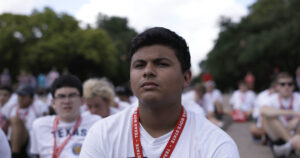‘Boys State’: All Is Fair In Student Government

Like any good (read: bad) election cycle, Boys State has an underdog’s meteoric rise, a conniving puppet master, a debate stage bombshell, an electoral procedure hiccup, and a thousand questions about America’s future drowned out by the volume of its present.
This A24 / AppleTV+ documentary (winner of Sundance’s 2020 Grand Jury Prize in its category) leaves the political theater to the amateurs. That is, several hundred young men attending the American Legion’s long-running politics camp in 2018. The results captured by directors Amanda McBaine and Jesse Moss (The Overnighters, The Bandit) reveal volumes about Gen Z political animals the country is raising.
Sort of like Model UN but with more Hamilton / Jefferson worship, Boys State is a deeply curious entity in and of itself. Two parties, the Federalists and the Nationalists, form by random assignment and then attempt to elect a slate of candidates in both primary and general runs. Their platforms constitute real-world issues—gun control, reproductive freedom, police violence, and more—but they don’t, how to put this, do anything. The parties simply attempt to build consensus around a platform and trot their candidates out for speeches, debates, and one climactic vote tally.
Regrettably but perhaps shrewdly, the documentary has to brush quickly past looming questions about what the hell this all is. One certainly wonders what Girls State is like (not to mention the Legion’s archaic reasoning for segregating by gender) and how vastly different the debate would look if not solely comprising 500 boys with testosterone bursting out of their pores. (Fun side note: my fiancé realized after some memory-jogging that she attended Girls State in Nebraska circa 2007. Her takeaway was that they got to stay in college dorms.) That McBaine and Moss embedded themselves in the Texas iteration of the camp perhaps led to some of the fire-branding around gun rights, in particular. Nobody’s ever called it “Texas Nice.”
Framing questions aside, it’s the access that makes Boys State so riveting, plus the fascinating irony that these ambitious 17-year-olds crave a spotlight they don’t yet know how to hide in. Plainly etched on their faces are shock and disappointment when their speeches are blown away by another candidate, nor do they yet see any problem with freely acknowledging they’re merely playing when it comes to their expressed beliefs, even if those beliefs equal banning abortion.
At every turn, the sentiment of “they’re just teenagers” deepens the hilarity, the inspiration, and the horror of the mock electioneering. Moss and McBaine thankfully recognize the ample levity at their fingertips and take us inside the talent-show auditions and marching band hijinks happening just to the side of the junior parliaments. Those nuggets are key for reminding the audience not to get too swept up in the results of a mock election. And it’s easy enough to do so, just the same way we might delude ourselves into believing DNC speeches are important. It’s legitimately remarkable to watch one young gubernatorial candidate, Steven Garza, ascend into competition for the camp’s highest office through his version of door-knocking and genuinely moving speeches. It’s equally as bone-chilling to witness some attendees realize they’re more fit to be Karl Rove than George W. Bush. If you lack an earnest bone in your body at age 16, what are you willing to say on OANN at 31?
The most revealing feature of Boys State may reside in the camp’s implicit construction, a tradition that the opening credits tell us attracted teenage Bill Clinton, Dick Cheney, and Cory Booker through the decades. There are political parties, yes, but there is no public. There is no populace. There is no work to be done after election day. One semester on any high school student council could teach more about governance and practical leadership than Boys State.
This is a wildly entertaining and disturbing look at an advancement crash course—and all that inextricable passion and cynicism that come with learning to get what you want in America.
All Episodes
our favorite movies
all movies
Wait, What is This?
Movie Reviews & Reappraisals
Be Reel was a movie reviewing & reappraising podcast hosted by Chance Solem-Pfeifer and Noah Ballard.
We cherished our 8-year run, talking to filmmakers like Gus Van Sant, insulting each other’s taste, and laughing to high heaven.
Chance’s new movie podcast, The Kick, continues to explore curated sub-genres and movie geekery. Noah is a frequent and beloved guest.